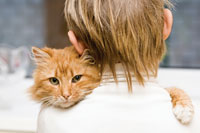When you have a preschooler, chances are, life’s complicated enough. So why get a pet? They are cute, cuddly and fun, sure, but did you know they’re also good for your health? Recent studies show that having a pet at home can reduce stress, lower blood pressure, improve your mood and reduce loneliness. And for preschoolers, pets can provide very early lessons in responsibility.
It’s no trick to get a preschooler on board with the idea of adopting a pet. From Curious George to the Littlest Pet Shop, animal books and toys are fascinating to preschoolers, so what could be better than the real thing? But as any parent who has taken their child grocery shopping knows, decisions based solely on a preschooler’s opinions can be questionable. So what else should parents take into consideration when deciding which pet to adopt?
Pick of the litter
According to Katie Olsen, a shelter manager for the Seattle Humane Society, it’s essential that you choose a pet that matches your current lifestyle, not what you’re hoping your lifestyle will become. If you are a couch potato now, don’t suppose that your new dog will unearth a long-suppressed passion for jogging. By the same token, if your preschooler likes to taunt the neighbor’s cat, a newfound sensitivity will not necessarily emerge upon getting a cat of your own.
So which animals suit family life with young children? According to Olsen, a dog is most likely to thrive with a family that is outgoing and active. Hiking, camping and the great outdoors are all a dog’s forte. If, however, yours is a family that is more likely to be found indoors curled up with a novel (or a lift-the-flap book, as the case may be), you may instead want to consider getting a cat. Besides being smaller, a cat is more independent and requires less maintenance than a dog, she says. In addition, smaller animals, such as a guinea pig, hamster or fish, make great first pets for families who may not be able to keep up with the exercise and training demands of a dog.
Not surprisingly, dogs and cats are by far the most popular pets in America, according to the American Pet Product Manufacturers Association (APPMA). Dr. Natalie Warren, a veterinarian at Metropolitan Veterinary Hospital in Tacoma, recommends that parents of preschoolers consider getting a dog at least 2 years old or a cat over 1 year of age. “Adult dogs and cats require less time and attention once they have successfully completed the transition into a new home,” says Warren. “You can also better gauge how hardy and tolerant an adult animal will be of a young child’s enthusiasm.”
When it comes to puppies, there’s no denying the cute factor. Despite this, Warren advises parents to consider whether they have enough time to properly care for a dog younger than 1 year of age. “Puppies require a great deal of time, patience, training and supervision,” she says. Warren also cautions that although young kittens and puppies have sharp teeth and claws, they are in fact quite fragile. This combination of qualities can lead to unintended harm to your preschooler and to the animal during play.
Size 'em up
In addition to age, size is an important consideration when choosing a dog. “Very small dogs are more fragile and can be too easily frightened to be around small children,” says Warren. She recommends larger dogs and sturdier breeds because they fare better amid the pandemonium that will inevitably arise in a home with a preschooler.
When parents feel that they are ready to adopt a particular animal, it is very important to get information about the animal’s personality, current health and living conditions, and the animal’s history. Shelters and responsible breeders should be happy to provide this kind of information, says Warren. “Many animal shelters have personnel who spend quite a bit of time with the animals and are trained to help people select an animal with a personality suited to the adopting family,” she says. Families looking for a reputable breeder may want to start by consulting a local veterinarian.
Once you’ve brought your pet home, it’s a great idea to get kids involved in caring for their new companion. With all pets, Warren stresses that it’s important for parents to oversee the feeding — and all interactions — between a pet and their young child. With proper supervision, she says, children can develop confidence, compassion and good communication skills through their interactions with a pet.
Laura Mackenzie is a freelance writer. She lives in Redmond with her husband, two kids ages 7 and 3, and 1-year-old cat Sydney.
RESOURCES
Websites:
www.seattlehumane.org
www.metvetpets.com
www.dogbreedinfo.com
Books:
Adopting Pets: How to Choose Your New Best Friend by Bill Gutman
The Complete Idiot’s Guide to Choosing a Pet by Betsy Sikora Siino
The Dog Lover’s Companion to Seattle by Steve Giordano









